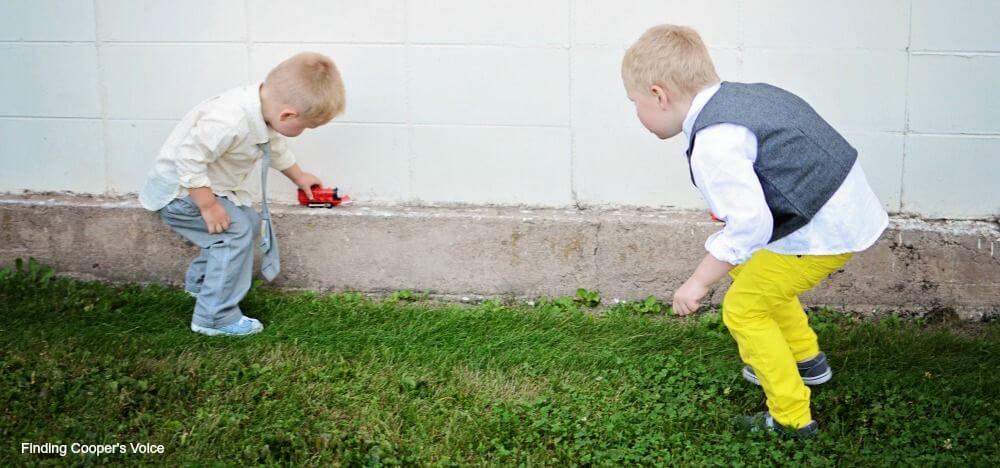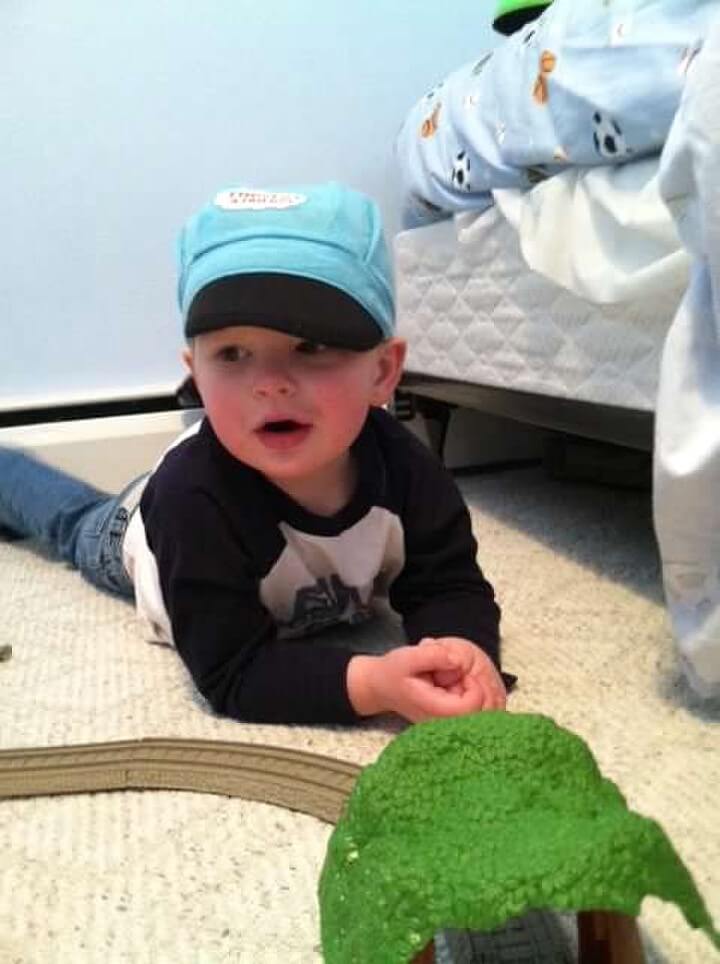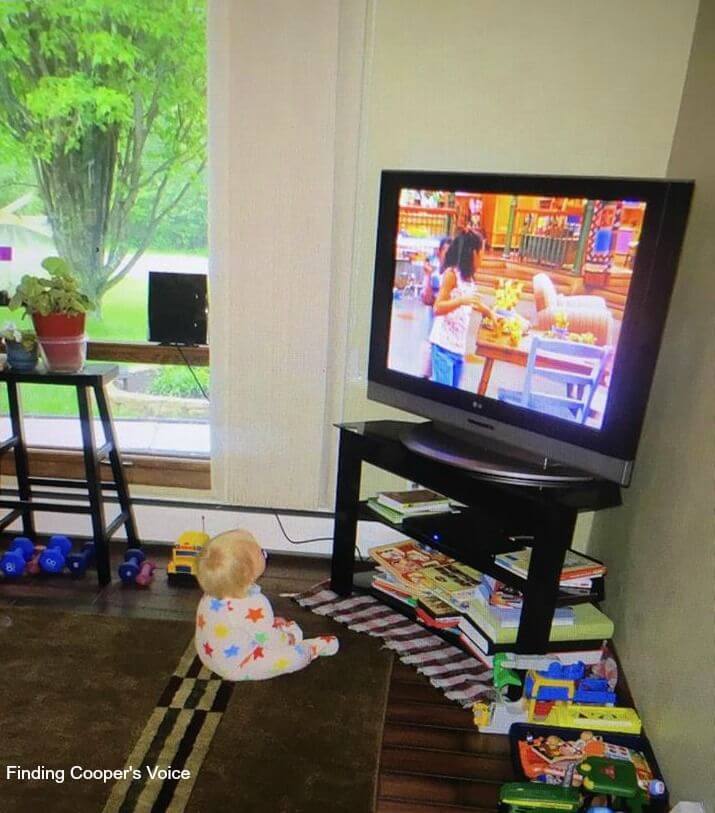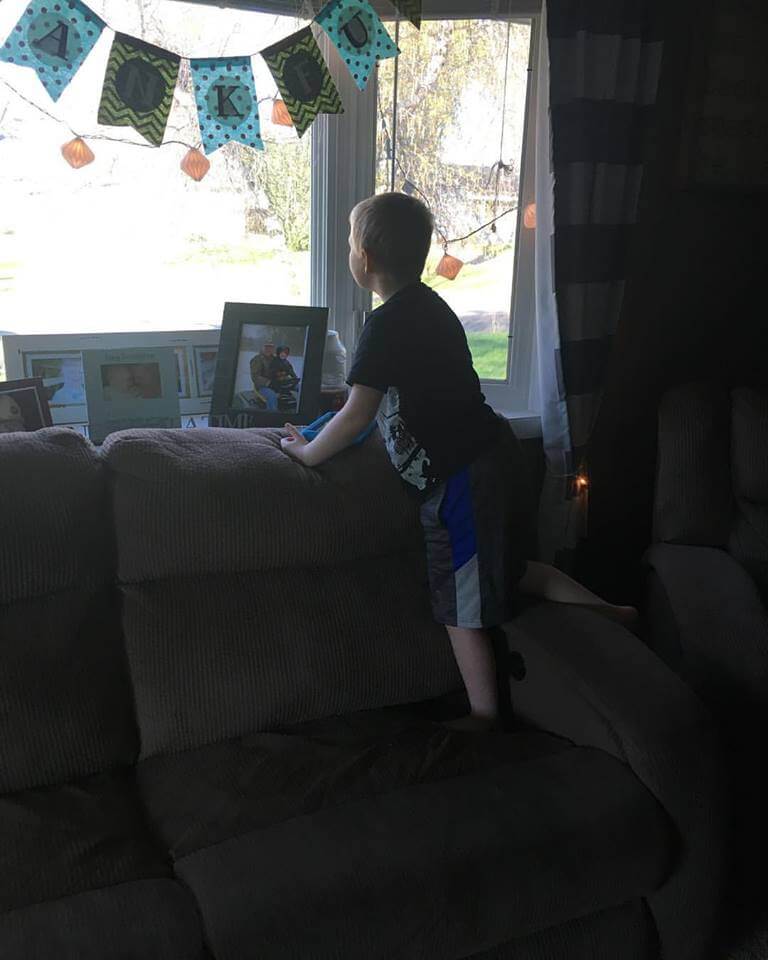When the Autism Checklists are Wrong

I like to talk about common misconceptions surrounding Autism because I was lead astray by well-meaning friends, loving family members, a guilty, worried conscious, and the damn internet. I like to talk about misconceptions around autism because I was so confused before I knew. Before I REALLY knew. And lost. And scared.
I was so desperate for my son to NOT be autistic that I believed anything I read on the internet…or that was told to me.
I was a new mom with a beautiful, smart, cuddly baby boy. A baby boy who never slept and was never content.
My son couldn’t be autistic. He just couldn’t be.
I want to say that no friend or family member (unless they are a trained medical profession) can diagnosis autism…or not diagnosis autism. I really do believe that a parents intuition is usually right as well. I often wonder if any parent is TRULY surprised with their child is diagnosed? Can it really be that big of a shock? I guess I don’t know. By the time my son was actually diagnosed I was well versed in autism.
Autism Checklists
When Cooper was two I became obsessed with Autism checklists like this one. I can still see my 29 year old self. I’d always google about Autism late at night. I’d search for something like….’nonverbal at age two.’ And every result would be about Autism. My stomach would drop. And then I’d end up on some checklist or quiz thing. And I would answer truthfully.
- If you point at something across the room, does your child look at it? (For Example, if you point at a toy or an animal, does your child look at the toy or animal?) Yes, he does.
- Have you ever wondered if your child might be deaf? Nope, never once.
- Does your child play pretend or make-believe? (For Example, pretend to drink from an empty cup, pretend to talk on a phone, or pretend to feed a doll or stuffed animal?) Never. NOT AT ALL!
- Does your child like climbing on things? (For Example, furniture, playground equipment, or stairs) Yes, sometimes. This one would stump me. Should the answer be yes? Should it be no?
- Does your child make unusual finger movements near his or her eyes? (For Example, does your child wiggle his or her fingers close to his or her eyes?) Never once.
Yes, he points. Yes, he waves. Yes, he’s social. Yes, he makes eye contact.
Every time the answer would be ‘not autistic.’ I would breathe the biggest sigh of relief. I trusted those dumb lists. I took every single one to heart. I relied on those checklists.
I became obsessed with all the reasons why my son was NOT autistic. I think deep down I was so scared that my son WAS autistic that I believed everyone that said he couldn’t be. In a way I was drawn to them. I loved people that wanted to talk about how my son was NOT autistic. It comforted me. It gave me hope. And it lead me astray.
Autistic Children Don’t Wave
Before my son was diagnosed…and even after I guess…I was told so many bizarre things about what people ‘thought’ autism was. According to some well meaning people, children with autism never wave. Or smile. Or laugh. Or point. Or interact with others. They don’t have loving connections with blankets or stuffed animals. They don’t like people. They rock in corners. They are aggressive and dangerous. They are unhappy. They don’t make eye contact. They are withdrawn.
Someone told me all autistic kids hate tags on their clothes. And the feeling of grass or sand. They hate baths and having their nails cut. I was even told autistic babies don’t clap or do ‘so big.’

I have heard everyone of these facts numerous times. So, you can imagine how confused I was. At age two my son really was quite ‘typical’ by the Baby Center email guidelines. He made eye contact like a rock star. He laughed, pointed, smiled, and waved. He’d see a birdy or an airplane and get my attention. He loved his trains and his blanket. He didn’t rock in a corner. He wasn’t miserable. Yes he flapped…but not obsessively. It was more out of excitement. That couldn’t possibly be autism.
The checklists rely on these ‘typical’ Autism markers. So Cooper passed with flying colors every single time.
I became so good at justifying. I’d say…oh, he does this…BUT….
But My Baby Plays Trains
A friend swore she heard somewhere that autistic children never play with toys (she heard this from a nurse). And she knew Cooper loved playing trains because I shared pictures on Facebook of our family ‘playing.’ What she didn’t know was Cooper was obsessed with trains and how they went in a circle. He was rigid and intense.
Yes, Cooper loved ‘playing’ trains. Therefore, he wasn’t autistic. When really he obsessed over his train track to the point where he would meltdown and have to be separated from it.
In reality…Cooper didn’t play at all. I can say that now. But as a new mom I didn’t really know the difference. Or, I wasn’t ready to really see the difference. And look how cute he was in his train hat. If only this picture could share how stressful these times truly were. No one could touch touch the trains. And yes, I was there…but not for playing. My sole purpose was setting up the train. That is it. His Thomas the Train track became a point of stress in our home. Eventually, we had to actually hide the trains because they were causing him so much anxiety.

Just like my son’s ‘playing, the rest of his autism traits were hidden to the outside world. As his mother…I knew though. I saw the subtle signs. He hated being touched by others. He flapped when he was excited. He’d push strollers for hours. He refused to play. He had zero imaginative play. He never sat down. He never spoke.
Television Obsessed
By nine months he was watching television obsessively. It became the only thing he could do. But, I didn’t share that on Facebook. I didn’t tell people. I felt like a failure. We went to a cabin once and four of the five children swam, ran, roasted marshmallows, built forts and got dirty. My son sat in the back of our car and watched a movie on his iPad. I felt like the biggest failure. No matter what we were doing he needed technology.
It started small…with PBS kids. And then graduated to an iPhone. Soon he had his own iPad. And then three Kindles. BUT…the Autism checklist asked about joint attention. Well, Cooper had it. He was always showing others what was on the screen. The question should’ve said something like….’does your child engage in a variety of activities? Does your child obsess over technology? Does your child transition easily away from preferred activities?’

My Son is a People Person
Another big question on the Autism Checklist is about your child’s relationships with other people. It alludes that Autistic children don’t like people. They isolate themselves. They don’t socialize. I was so confused by this and took pride in the fact that my son loved people. He always has and every year he seems to love them even more.
Someone would come to the door of our home and Cooper would crawl, toddle, and eventually run to greet them. He would stand at the window waiting for visitors.
I’d tell myself…my son loves people…so therefore, he is not Autistic. In reality, most autistic children are quite social and interact with adults. Where they typically struggle is with other children. The checklist failed to ask this.

What’s my Point?
Autism is a mysterious and confusing neurological disorder. It presents differently in most child. It is also a spectrum. I also believe parents know their children best but we often aren’t ready to see the truth. We are human.
Remember to trust your gut. I was so worried about my son being autistic that I internalized a lot of it. I was scared to say it out loud because then it might actually be true. So I’d Google late at night. I’d frantically search blogs for other children like Cooper that were not autistic. It gave me comfort. It brought me peace. Deep down I thought I could outsmart Google and every checklist I found. I couldn’t though. I spent a lot of emotional energy trying to outrun autism.
I was never able to though. By the time my son was diagnosed I wasn’t surprised. At that point I was practically an expert.
Finding Cooper’s Voice is a safe, humorous, caring and honest place where you can celebrate the unique challenges of parenting a special needs child. Because you’re never alone in the struggles you face. And once you find your people, your allies, your village….all the challenges and struggles will seem just a little bit easier. Welcome to our journey. You can also follow us on Facebook and subscribe to our newsletter.


Hello Kate,
I just came across your blog recently, and want to say thank you for sharing. My son is 7 now and thanks to aba and prt had made a lot of progress. I can relate to what your saying. I too went frantically on the internet late at night searching for answers. Now I know he is unique and no list will ever match. You remind me of following my gut feeling.
Thank you. Erin
Hi there. I’m been following your blog for a long time. First I like to say you are doing a great job and I too had the same issue with these checklist. My kids would pass those online autism check lists including the modified M-CHAT. Like yours they could wave, had joint attention, could point and and understood everything you said. Both my kids are non-verbal at 1 and 3 and have similar developement to each other. I’ve had several experiences that have helped me understand my children from a different perepctive rather than an ‘autistic or not’ viewpoint. I think an autism diagnosis is simply what they give parents to fit a huge set of behaviors which they have no other answers for. Autism is just behavior that fit the criteria at a given time. When experts tell you to abdondan all hope or to expect a full recovery, I feel that is simply dangerous advice. Some kids will remain classically autisitc, others won’t. They are all different. We do not know why a child is developing a certain way, we can not simply lump all slow or atypical developers into one group for which there is no blood test or genetic marker and give them a bleak or hopefull prognosis. At attempt to fix this, in 2015 the DSM removed Aspergers from under the autism umbrella as well as PDD-NOS. So technically Aspergers and higher functioning autisms no longer exist as an Autistic Spectrum Disorder. This is another reason children are losing their diagnosis with time. If they progress socially and communicatively, they will no longer qualify. This is supposed to allow for less grey area under what qualifies as autism and prevent over diagnosis. I don’t know if it’s truly helping with this issue though.
I think all we can do is try to understand our situation and situations like ours. I started to look at things differently when I enrolled my son in speech therapy at 15 months. We was very good at engaging with the therapist but typically wanted to do activities that involves academics (numbers, abcs, puzzles) than play with plastic animals or other imaginary toys. He also loved activities with rotational movement (stilll does). After several sessions, she abruptly asked me what my husband did for a living. I told her he was a software engineer. She smiled and said ‘I’ve seen this before’. She told me how several children in her family who were late talkers, grew up to be engineers. She said it was a pattern in some familIies. I found this concept to be fascinating so I went online to find more info. I found that her observations were nothing new. That many parents had children who were late late talkers (mostly boys), children who were very analytical yet quirky. Many of these children were diagnosised with autism but later ‘outgrew’ their diagnosis. I even spoke to my mother in-law about this pattern. My husband fit this pattern to a T. He was a quirky late talker but slowly blossomed into brilliant, witty, and loving man. This pattern or condition is known as the Einstein syndrome. Have you heard of it? To be clear, Einstein syndrome isn’t about a splinter skill or savant capabilities. It is about a unique developmental trajectory. These kids have very analytical minds. They often prefer concrete, physical play to asbstract or imaginary play, especially in the beginning. There’s some controversy, however, about condition. Many claim the Einstein syndrome is just a fancy term high functioning autism. Maybe it is, but the whole point to me writing this is pointing out how these children are social yet nonverbal for a long time but later blossom into functioning verbal people. That’s the pattern.
Back to Cooper. Cooper and my boys are very much alike. They both have great joint attention, great non verbal communication, a sense of humor, delayed potty training and quirky habits (moving furniture, lining things up). The biggest struggles you talk about with Cooper (not able to sit still, unaware of dangers, obsession with technology, preference for electronic media to most activities ), are what really differs between our kids. I believe these traits are more central to ADHD than autism or ES. Many kids with autism have ADHD but they are not one in the same. Before I became a stay at home mom, I worked in vocational rehabilitation helping adults with disabilities. I’ve worked with several smart, highly verbal non-autistic adults with these same struggles. Many of these people had an ADHD diagnosis.
I’ve gone to many other blogs about autistic children but they rarely seem to mirror my situation. The ones that did, I found the children continued to develop and the blogs just sort of dissipated with time. This blog is striking to me. My oldest was obsessed with books as a baby, knew his shapes at 15 months, his abcs at 2 and at 3 can now read. I would NEVER had known these things if he wasn’t able to sit still. Even though Cooper is a mover and shaker, he seems to know so much and he even has wordless conversations with you! That is not classic autism! I promise! My son is the same way. From watching your videos, I bet Cooper knows all of these things and more. I bet he’s already reading and counting.
So I just wanted to give you another point of view in light of all the confusing diagnostic criteria. I’m not trying to rediagnose Cooper or give you false hope, I’m just trying to give you other possible explanations for the inconsistencies of childhood development. You are doing a fantastic job. I think you taking Cooper out of Kindergarten and replacing it with aba therapy with therapists he loves was fantastic. They will help him to be more present, and more confident so you can see just all that Cooper is capable of, which is endless!
Jade
It’s me again. I just reread the DSM-5 and misinterpreted its criteria for ASD. Even though Aspergers and pdd-nos is not mentioned in the criteria, it is mentioned in a side note staing if a child received a diagnosis from DSM-4, they still qualify under the ASD umbrella. So sorry, I just wanted to correct that. In a way, the DSM-5 is MORE inclusive.
Hey Jade! Thank you for this comment! Very helpful! Email me if you ever want to connect. findingcoopersvoice@gmail.com. We sound like we have a lot in common!
I just read this and it was exactly me with my son. I appreciate so much that you share your experiences and feelings. Our son JJ was diagnosed on the spectrum last fall at 3. We have a nephew a month and a half younger. Watching the differences between them was really hard. When I didn’t understand what was going on I felt like a total failure. Waiting for him to talk in full sentences, play imaginitively, try healthy foods etc. is a struggle. I appreciate so much what you share. And can relate on so many levels. ❤️
I really like how you talked about autism in kids not meaning that they isolate themselves. My sister has been wondering if her son is autistic or not, and I think that being able to find the right type of checklist to figure things out could be helpful. I’m glad I found your article and how you talked about how you should trust your gut and not run from autism. I’m going to have to share this with my sister and see if we can help her figure out how to best be a good parent to a child with autism! Thank you!
I’m reading this blog with tears in my eyes. My 2.7 year old has been diagnosed with autism and I still search the websites for articles about autism diagnoses being wrong. It is like I can’t get over the diagnosis because what I see is a happy girl who smiles and engages me. The truth is that she barely talks, has poor receptive skills, and toe walks. The flags of autism wave high but my heart won’t accept the diagnosis so I am stuck in this horrible emotional rut.
I am so happy to have found this. My 6-year-old daughter just went through testing. I knew without the actual diagnosis that she had ADHD but was surprised to find out that she has moderate autism. She talks up a storm, she is overly friendly with adults, she makes eye contact, does all the normal stuff that you would associate with typical autism. During the testing, it was found she can’t read faces or emotions. She very rarely does imaginative play, she’ll feed a baby doll or dress a barbie and that’s about it. She has friends but not very many and doesn’t keep them very long and has a really hard time interacting with other children but adults shes completely fine with. I was honestly questioning the diagnosis until reading this. Thanks for posting!